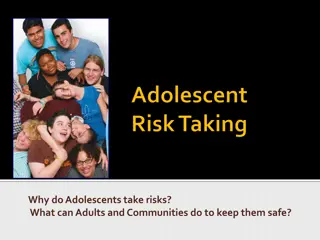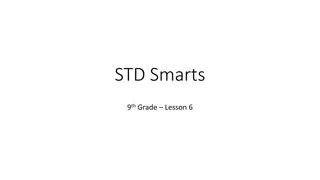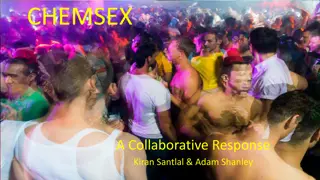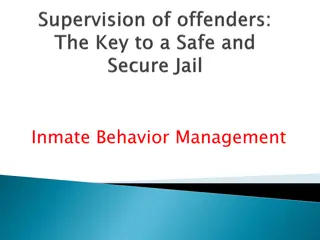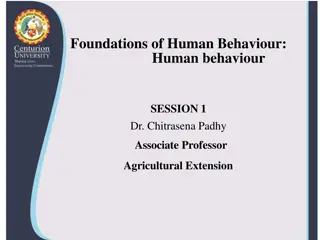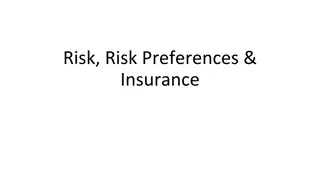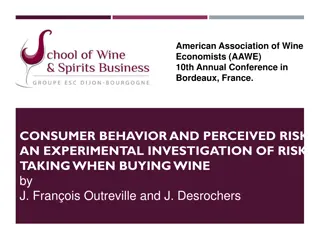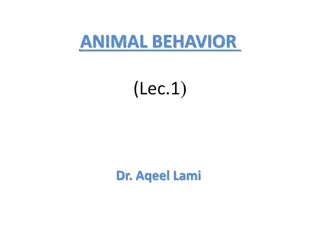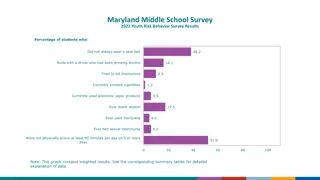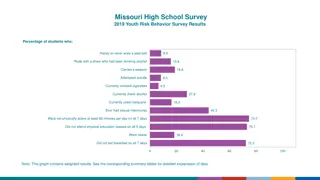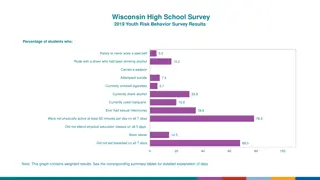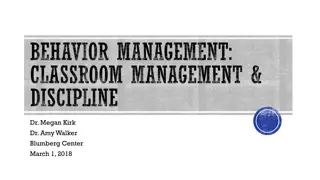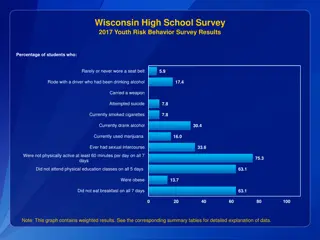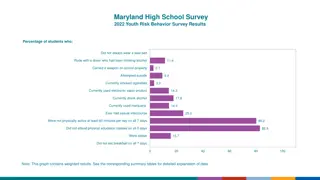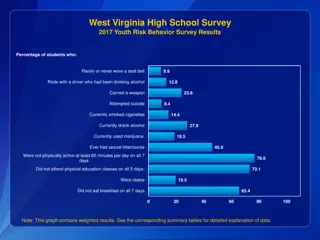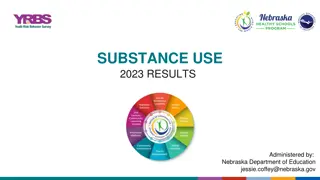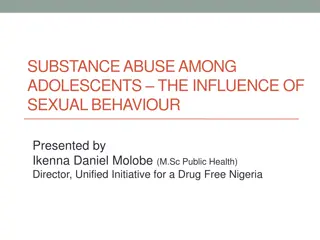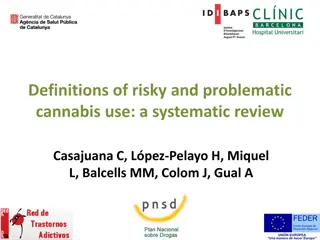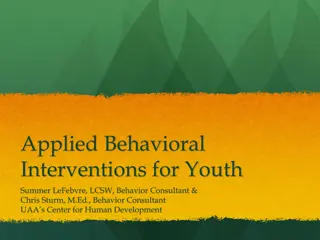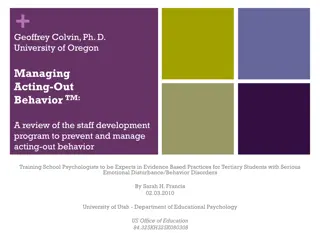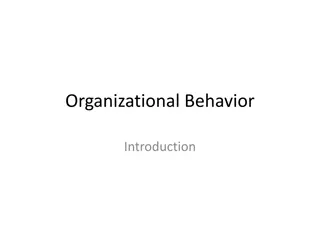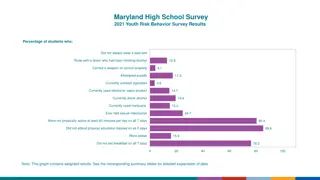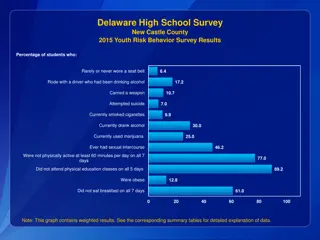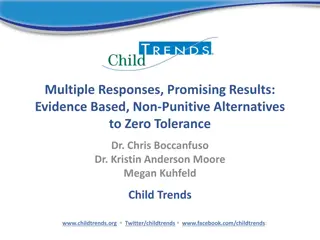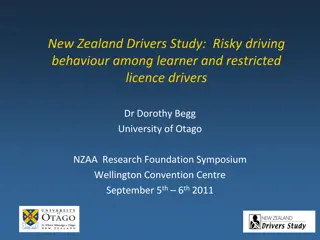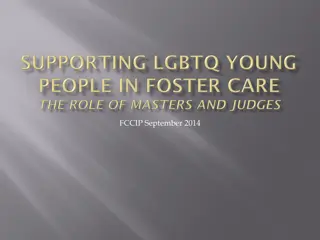Function Based Thinking
Function-based thinking in Missouri Schoolwide Positive Behavior Support, emphasizing data-based decision-making, mission clarity, and effective teaching practices. Understand how behavior is related to the environment and how environmental interventions play a key role in shaping expected behaviors
6 views • 27 slides
Digital Citizenship for Youth with Disabilities: Red Flags and Online Safety
This adapted digital citizenship material focuses on educating youth with intellectual and developmental disabilities about recognizing red flags online, understanding risky behavior, and navigating online relationships safely. The content includes engaging activities, discussion prompts, and scenar
0 views • 24 slides
Addressing Predatory Behavior in the Fellowship
Predatory behavior, especially towards vulnerable members, is a concerning issue in the fellowship. This behavior includes unwelcome advances, exploitation of power dynamics, and institutional sexism. The discussion on predatory behavior necessitates honest dialogue and a united approach for a safer
3 views • 13 slides
Understanding Adolescent Risk-Taking Behavior and Promoting Safety
Adolescents often engage in risky behavior due to a combination of factors like raging hormones, immature thinking, inexperience, curiosity, and boredom. While the adolescent brain is optimized for certain functions, it is still developing in areas related to cognitive control and decision-making. A
3 views • 25 slides
STD Smarts 9th Grade Lesson: Risky Behaviors and STD Testing
In this 9th grade lesson on STD Smarts, students explore risky behaviors related to STD transmission and delve into the importance of STD testing. The lesson covers various scenarios and myths surrounding STDs, challenging students to consider their choices and knowledge about sexual health. Through
0 views • 32 slides
Understanding Consumer Behavior in Marketing
The design of a marketing program starts with understanding consumer behavior. Consumers, as the end users, play a crucial role in shaping market trends. Producers seek insights into consumer personas, market behaviors, and influencing factors. Management focuses on the consequences of consumer beha
2 views • 26 slides
Understanding Psychology: The Science of Behavior and Mental Processes
Psychology is the scientific study of behavior and mental processes. Psychologists study both observable behavior and private mental processes. The primary goals of psychology are to describe, understand, predict, and control behavior. Different branches of psychology, such as applied psychology, cl
2 views • 29 slides
Understanding Chemsex: Risks, Impacts, and Support
Chemsex involves using substances to enhance sexual experiences, often leading to extended periods of risky behavior and negative outcomes. Factors driving chemsex include sexual freedom, loneliness, and stigma. Addressing chemsex requires a comprehensive approach that considers both drug use and ps
1 views • 14 slides
Understanding Inmate Behavior Management in Correctional Settings
Inmate Behavior Management in correctional facilities involves supervising inmates, implementing corrective discipline, and fostering a fair and consistent environment. It emphasizes the importance of behavior management plans, identifying undesirable traits in supervision, and passing educational a
0 views • 19 slides
Understanding Human Behavior: Foundations and Factors
Human behavior is a multifaceted subject influenced by genetic makeup, culture, and individual values. It encompasses both overt actions and covert thoughts, a product of the individual and environmental factors. Psychologists study behavior from visible (overt) actions like playing football to inne
0 views • 20 slides
Understanding Normal and Abnormal Behavior: Perspectives and Definitions
Normal behavior varies from person to person and society, influenced by individual preferences and societal norms. Abnormal behavior is characterized by an inability to function effectively or personal discomfort. The concept of normality and abnormality in psychology raises complex questions about
2 views • 8 slides
Understanding Risks, Preferences, and Insurance in Poverty Alleviation
Strategies to help poor households increase income involve risky investments and reliance on self-employment. Limited access to insurance and financial instruments exacerbates economic risks, making saving and planning crucial. Expected Utility Framework defines how people make risky decisions based
0 views • 36 slides
Experimental Investigation of Risk Perception in Wine Purchases
The American Association of Wine Economists' 10th Annual Conference delved into consumer behavior and perceived risk when buying wine. The study explored risk, uncertainty, ambiguity, and conflict in wine purchases, presenting preliminary findings on risk-taking behaviors. An experimental investigat
0 views • 26 slides
Understanding Human Behavior: Insights for Social Workers
This material delves into the intricacies of human behavior, exploring factors influencing behavior such as heredity, environment, intelligence, needs, and motives. It covers the concept of human behavior, stages in life from conception to old age, and theories of human development by eminent psycho
2 views • 71 slides
Understanding Animal Behavior and Ecology
Animal behavior encompasses a range of activities such as feeding, breeding, and social interactions. Ethology focuses on studying behavior in natural environments, while behavioral ecology examines ecological aspects like predator-prey interactions. Sociobiology delves into the evolution of social
3 views • 5 slides
Maryland Middle School Youth Risk Behavior Survey 2022 Results
Survey results from the Maryland Middle School Youth Risk Behavior Survey 2022 reveal concerning statistics among students regarding seat belt usage, alcohol and substance use, mental health, and physical activity levels. The data shows varying percentages of students engaging in risky behaviors suc
0 views • 4 slides
Missouri High School Survey 2019 Youth Risk Behavior Results
This survey presents key percentages and numbers of high school students in Missouri regarding risky behaviors such as seat belt usage, alcohol and drug consumption, physical activity, and more. It outlines the prevalence of behaviors like not wearing a seat belt, riding with a driver under the infl
0 views • 4 slides
Wisconsin High School Survey 2019 Youth Risk Behavior Results
The survey results from Wisconsin high school students in 2019 reveal percentages of students engaging in various risky behaviors such as not wearing seat belts, riding with intoxicated drivers, carrying weapons, attempting suicide, smoking cigarettes, using alcohol and marijuana, having sexual inte
0 views • 4 slides
Understanding Behavior Management in Classroom Settings
Explore the essential topics of behavior management, classroom strategies, and discipline in educational settings. Delve into the functions of behavior, impact of trauma on learning, and effective management techniques. Learn how to identify underlying reasons for student behaviors, discuss behavior
0 views • 76 slides
Wisconsin High School Survey 2017 Youth Risk Behavior Statistics
This report presents the results of the Wisconsin High School Survey 2017, focusing on various risky behaviors among students. The data includes percentages and numbers of students who engaged in behaviors such as not wearing a seat belt, riding with a driver who had been drinking, carrying weapons,
0 views • 4 slides
Maryland High School Survey 2022 Youth Risk Behavior Results
The Maryland High School Survey 2022 Youth Risk Behavior Results provide insights into students' behaviors. Key findings include percentages and numbers of students who engage in risky behaviors such as not wearing seat belts, riding with drivers who drink alcohol, carrying weapons, attempting suici
0 views • 4 slides
West Virginia High School Survey 2017 Youth Risk Behavior Results
The West Virginia High School Survey 2017 provides insights into risky behaviors among students. Findings include percentages of students who rarely or never wore a seat belt (8.9%), rode with a driver who had been drinking alcohol (12.8%), carried a weapon (23.8%), and more. The survey also reveals
0 views • 4 slides
Targeting Emotions to Facilitate Behavior Change in Older Adults
Efforts in changing health behavior have traditionally focused on social and cognitive factors, but recent evidence highlights the importance of affective states in decision-making and behavior change. Janey Peterson discusses the role of emotions in achieving and sustaining behavior change to benef
0 views • 11 slides
Nebraska Youth Risk Behavior Survey 2023 Results Overview
The Nebraska Youth Risk Behavior Survey (YRBS), administered biannually since 1991 by the Nebraska Department of Education, provides insights into various health-related behaviors among high school students. The survey monitors behaviors such as alcohol and drug use, tobacco use, unhealthy dietary h
0 views • 64 slides
Grading Criteria for Effort and Behavior in Educational Reporting
Effort and behavior in educational settings are evaluated based on criteria ranging from Excellent to Causing Concern. Pupils demonstrating excellent behavior show respect, responsibility, and positive engagement in learning. Those with good behavior exhibit cooperation and respect for others, albei
0 views • 9 slides
Understanding Adolescent Substance Abuse and Its Connection to Risky Sexual Behavior
Adolescents are vulnerable to substance abuse and risky sexual behaviors, often influenced by factors such as social issues, peer pressure, and lack of proper education. Early exposure to sex and drugs can lead to negative consequences, including teenage abortion. Awareness, prevention strategies, a
0 views • 24 slides
Definitions and Criteria for Risky and Problematic Cannabis Use: A Review
The systematic review explores definitions of risky and problematic cannabis use, highlighting the need for early interventions in at-risk users. It identifies gaps in official definitions, distinguishes between risky and problematic use, and provides insights from a methodical analysis. Screening t
0 views • 14 slides
A Risky Choice - An Intriguing Journey Through Decisions
Embark on a captivating visual narrative depicting the consequences of A Risky Choice. Follow along as choices unfold through a series of thought-provoking slides, each revealing a different aspect of the decision-making process. Explore the complexities of decision-making and the potential outcomes
0 views • 21 slides
Understanding Applied Behavior Analysis (ABA) for Youth Interventions
Applied Behavior Analysis (ABA) is a science focusing on improving human behavior by increasing desired behaviors, teaching new skills, and generalizing behaviors. ABA emphasizes observable behaviors, measurement of behavior change, and the use of interventions in various settings like classrooms an
0 views • 25 slides
PBIS Expectations and Behavior Flowchart
The PBIS flowchart outlines behavior expectations and interventions for minor and major incidents in a school setting. It covers disrespectful behavior, disruption, defiance, property damage, theft, possession of weapons, and more. The flowchart guides teachers and staff on managing and addressing s
0 views • 6 slides
Managing Acting-Out Behavior: A Staff Development Program Review
This review discusses a staff development program created by Geoffrey Colvin, Ph.D., from the University of Oregon, focusing on preventing and managing acting-out behavior in students with emotional disturbance or behavior disorders. The program includes video presentations, strategies for behavior
0 views • 22 slides
Understanding Organizational Behavior and Individual Behavior
Organizational Behavior (OB) is a multidisciplinary field that combines knowledge from various disciplines to study and manage organizations effectively. It emphasizes the application of this knowledge to enhance organizational effectiveness and the well-being of participants. OB is a useful concept
0 views • 38 slides
Comparative Analysis of Renewable vs. Fossil Fuel Power in India
The comparison between renewable and fossil fuel-based power in India reveals that the renewable energy sector has historically shown lower risk and higher returns than the fossil fuel sector. Investors perceive renewable energy investments to be less risky, with solar being seen as less risky than
0 views • 23 slides
Function-Based Behavior Support Plans: A Comprehensive Guide
Explore the process of developing Function-Based Behavior Support Plans (BSP) using Functional Behavioral Assessment (FBA). Understand the concepts of function and functional behavior assessment, learn how FBA/BSP fits within a multi-tiered support system, and practice developing BSP for students. D
0 views • 74 slides
Understanding the Impact of Maltreatment on Social Development
Maltreatment, including coercion and abuse of power in family environments, can lead to negative effects on children's social development. It results in lower levels of prosocial behavior, verbal communication, and undervaluing of children. Maltreated children may suffer from low self-esteem, negati
0 views • 15 slides
Maryland High School Survey 2021 Youth Risk Behavior Results
The Maryland High School Survey 2021 presents youth risk behavior results indicating percentages of students engaged in various activities such as not wearing seat belts, riding with alcohol-impaired drivers, carrying weapons, attempting suicide, smoking, using substances, engaging in sexual interco
0 views • 4 slides
Delaware High School Survey: Youth Risk Behavior in New Castle County (2015)
Results from the 2015 Youth Risk Behavior Survey in New Castle County, Delaware high schools highlight various behaviors among students. The data shows percentages and numbers of students who engaged in risky activities such as not wearing seat belts, riding with drivers under the influence of alcoh
0 views • 4 slides
Evidence-Based Alternatives to Zero Tolerance Policies
Zero tolerance policies in schools have not shown clear effectiveness and are associated with negative outcomes for students. Suspensions and expulsions linked to zero tolerance can lead to disconnection from school, risky behavior, poor academic achievement, and entry into the school-to-prison pipe
0 views • 22 slides
Risky Driving Behavior Study Among New Zealand Drivers
The study focuses on risky driving behavior among learner and restricted license drivers in New Zealand. Led by Dr. Dorothy Begg from the University of Otago, the research involves a prospective cohort study to examine newly licensed drivers at different stages of licensing. Utilizing national datab
1 views • 47 slides
Challenges Faced by LGBTQ Youth in Foster Care Systems
LGBTQ youth in foster care encounter significant challenges due to family rejection, discrimination from service providers, and high rates of mental health issues, substance abuse, and risky behaviors. These youths are more likely to experience homelessness, abuse, and conflict compared to their pee
0 views • 16 slides



